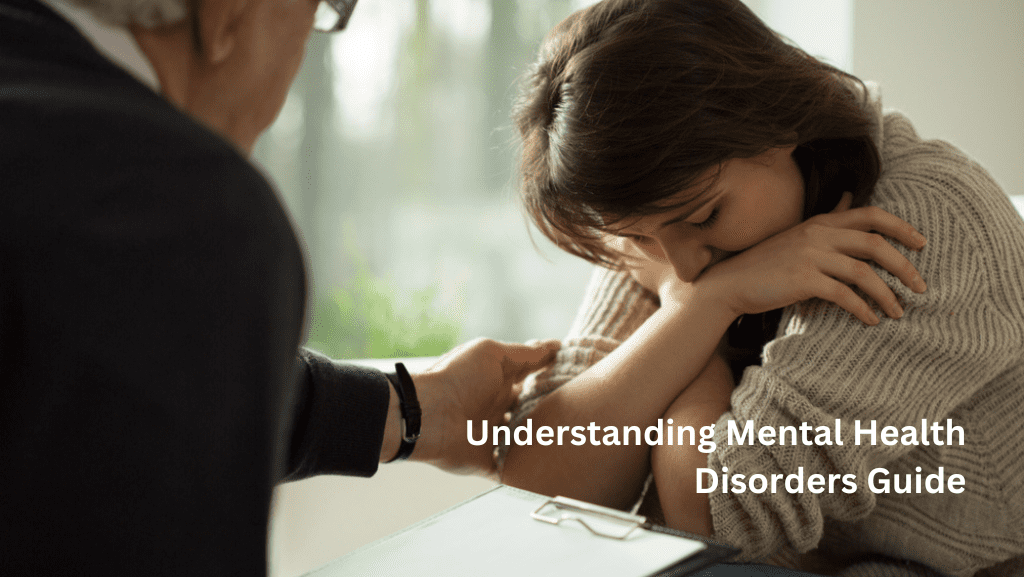Understanding Mental Health Disorders Guide

Welcome to our comprehensive guide on Mental Health Disorders. In this article, we aim to provide valuable insights and support options for individuals dealing with these challenges. Mental Health Disorders encompass a range of conditions that affect a person’s emotional well-being and daily functioning.
By understanding these disorders and the impact they can have on individuals, we hope to empower readers with the knowledge needed to navigate these challenges effectively. Whether you are seeking information for yourself or a loved one, this guide will provide clarity on various aspects of Mental Health Disorders.
We will begin by defining what Mental Health Disorders are and exploring the different types and categories. Understanding the symptoms and common signs associated with these disorders is crucial in identifying and addressing them.
We will also discuss the importance of seeking help and treatment for Mental Health Disorders. There are various support options available, including therapy, medication, and support groups. By exploring these avenues and finding the right approach for individual needs, individuals can work towards their well-being.
Coping mechanisms and strategies play a vital role in managing Mental Health Disorders. In this guide, we will delve into various techniques such as self-care, stress management, and lifestyle changes that can contribute to overall well-being.
In conclusion, this guide aims to make Mental Health Disorders more understandable and offers insights into navigating them effectively. By seeking appropriate help, employing coping strategies, and accessing support options, individuals can lead fulfilling lives despite these challenges. Let’s start this journey together.
What Are Mental Health Disorders?
Mental Health Disorders encompass a wide range of conditions that affect a person’s emotional, psychological, and behavioral well-being. These disorders can impact individuals of all ages, races, and backgrounds, and their prevalence is alarmingly high in our society.
There are numerous types and categories of Mental Health Disorders, each presenting unique challenges and symptoms. Some common examples include:
- Anxiety Disorders: Intense and excessive worry or fear that can interfere with daily activities.
- Depressive Disorders: Persistent feelings of sadness, hopelessness, or loss of interest in activities.
- Bipolar Disorder: Extreme mood swings ranging from depressive lows to manic highs.
- Personality Disorders: Patterns of thinking, feeling, and behaving that deviate from societal norms.
- Psychotic Disorders: Distorted thinking, hallucinations, and delusions that impact perception.
The symptoms of Mental Health Disorders can vary, but they often manifest as changes in mood, behavior, and cognitive patterns. Individuals may experience persistent sadness, unexplained anger, social withdrawal, difficulty concentrating, sleep disturbances, or irrational fears. These symptoms can significantly disrupt one’s daily life, relationships, and overall well-being.
It is essential to note that Mental Health Disorders are treatable, and seeking professional help is crucial for effective management. Early identification and intervention play a significant role in improving outcomes for individuals dealing with these conditions.
Seeking Help and Treatment for Mental Health Disorders

Seeking help and treatment for Mental Health Disorders is crucial for individuals dealing with these challenges. There are various support options available that can provide the necessary assistance and guidance to navigate these disorders effectively.
The first step in seeking help is to understand the different treatment approaches available. Therapy is a common and effective option for addressing mental health issues. It involves working with a trained mental health professional to explore and manage the underlying causes and symptoms of the disorder.
Another treatment option is medication, which can be prescribed by a psychiatrist. Medications can help stabilize mood, reduce anxiety, and alleviate other symptoms associated with Mental Health Disorders. It is important to note that medication should always be taken under the guidance and supervision of a healthcare professional.
In addition, support groups play a significant role in the treatment and management of Mental Health Disorders. These groups provide a safe space for individuals to connect with others who are going through similar experiences. Through sharing stories, experiences, and coping strategies, support groups offer a sense of community, validation, and encouragement.
When choosing the right approach for seeking help and treatment, it is essential to consider individual needs and preferences. Some individuals may prefer a combination of therapy and medication, while others may find solace in support groups alone. The key is to find a personalized approach that feels comfortable and effective.
Key Points:
- Seeking help and treatment is crucial for individuals with Mental Health Disorders
- Therapy, medication, and support groups are common support options
- Therapy helps in exploring and managing the underlying causes and symptoms
- Medication can stabilize mood and reduce symptoms, under professional guidance
- Support groups offer a sense of community, validation, and encouragement
- Choose the right approach based on individual needs and preferences
Coping Strategies for Managing Mental Health Disorders
Managing mental health disorders can be challenging, but there are various coping strategies that can help individuals navigate these difficulties effectively. By incorporating these techniques into daily life, individuals can promote overall well-being and enhance their mental health.
1. Self-Care
Self-care plays a crucial role in managing mental health disorders. It involves prioritizing activities and practices that promote self-nurturing and relaxation. Engaging in hobbies, practicing mindfulness or meditation, getting enough sleep, and maintaining a balanced diet can significantly impact mental well-being.
2. Stress Management
Stress management techniques can help individuals better cope with the challenges and triggers associated with their mental health disorders. These techniques may include deep breathing exercises, progressive muscle relaxation, journaling, or engaging in physical activities like yoga or walking.
3. Lifestyle Changes
Adopting healthy lifestyle changes can have a positive impact on mental health. This may include regular exercise, spending time in nature, maintaining a consistent sleep schedule, minimizing alcohol and substance use, and reducing exposure to triggers and stressful environments.
4. Support Groups
Joining support groups can provide individuals with a sense of community and understanding. These groups offer a safe space to share experiences, gain valuable insights, and receive support from others who may be facing similar mental health challenges.
5. Therapy and Counseling
Seeking professional help through therapy and counseling can be instrumental in managing mental health disorders. Therapists and counselors can provide personalized strategies and techniques to address specific symptoms and challenges, offering valuable support and guidance throughout the recovery process.
By implementing these coping strategies, individuals can take an active role in managing their mental health disorders and improving their overall well-being. It’s important to remember that everyone’s journey is unique, and finding the right combination of strategies may take time. Exploring different options and working closely with healthcare professionals can help individuals find the most effective support options for their specific needs.
Conclusion
In conclusion, this guide has provided a comprehensive understanding of Mental Health Disorders and offered valuable insights on navigating them. It is crucial to acknowledge that these disorders affect individuals’ daily lives and can pose significant challenges. However, with the right support and treatment, individuals can lead fulfilling lives despite these obstacles.
Seeking appropriate help is key when dealing with Mental Health Disorders. Therapy, medication, and support groups are among the available options that can provide crucial assistance in managing these conditions. It is important to remember that there is no one-size-fits-all approach, and each individual’s needs may vary.
Coping strategies play a vital role in managing Mental Health Disorders. Engaging in self-care activities, focusing on stress management, and making lifestyle changes can contribute to overall well-being. These strategies, combined with professional help, can empower individuals to effectively navigate the challenges associated with Mental Health Disorders.
Remember, you are not alone. If you or someone you know is struggling with Mental Health Disorders, reach out for support. There are numerous resources available that can provide assistance, guidance, and empathy. By taking the necessary steps to prioritize mental health, individuals can find the support they need to lead fulfilling lives and manage their Mental Health Disorders effectively.
FAQ
What are mental health disorders?
Mental health disorders are conditions that affect a person’s emotional, psychological, and social well-being. They can impact a person’s thoughts, feelings, and behavior, causing significant distress and impairing their ability to function in daily life.
What are some common signs of mental health disorders?
The signs of mental health disorders vary depending on the specific condition, but some common signs include persistent sadness, changes in appetite and sleep patterns, social withdrawal, irritability, difficulty concentrating, and thoughts of self-harm or suicide.
How can I seek help for a mental health disorder?
Seeking help for a mental health disorder is an important step towards recovery. You can start by reaching out to a healthcare professional, such as a therapist or psychiatrist, who can provide an accurate diagnosis and recommend appropriate treatment options.
What treatment options are available for mental health disorders?
Treatment options for mental health disorders include therapy, medication, and a combination of both. Therapy, such as cognitive-behavioral therapy (CBT), can help individuals learn coping skills and develop healthier thought patterns. Medication may also be prescribed to manage symptoms.
What are some coping strategies for managing mental health disorders?
Coping strategies for managing mental health disorders include practicing self-care activities, such as exercise and relaxation techniques, seeking support from loved ones or support groups, managing stress through healthy lifestyle choices, and maintaining a consistent routine.
Is it possible to lead a fulfilling life with a mental health disorder?
Yes, it is possible to lead a fulfilling life with a mental health disorder. With the right support, treatment, and coping strategies, individuals can effectively manage their symptoms and pursue their goals and passions. Seeking help and utilizing available support options is crucial in this process.
